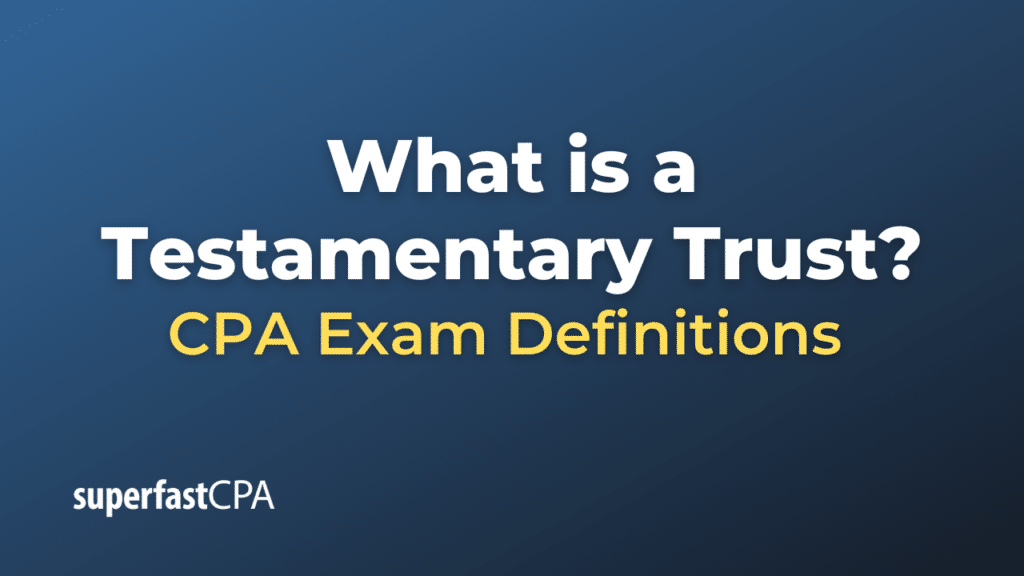Testamentary Trust
A testamentary trust is a legal and fiduciary relationship created through explicit instructions in a person’s will. This type of trust comes into effect only after the person’s death, and its terms are outlined in the will itself.
Here are the key features and details:
- Creation in the Will: The trust’s provisions are specified in the will of the person (called the “testator” or “decedent”). This includes details about how the trust should operate, the assets it will hold, and the beneficiaries it will serve.
- Becoming Operational After Death: Unlike living trusts, which are operational during the grantor’s lifetime, a testamentary trust is only activated after the testator’s death.
- Probate: Since a testamentary trust is a part of a will, the will usually must go through probate. Once the will has been probated and assets have been distributed in accordance with its terms, the testamentary trust can be funded.
- Trustee: The testator will designate a trustee in their will. The trustee is responsible for managing the trust assets and ensuring that distributions are made in accordance with the testator’s instructions. The trustee has a fiduciary duty to act in the best interests of the beneficiaries.
- Purpose: Testamentary trusts are often used to provide for beneficiaries who may not be able to manage their inheritance directly, such as minor children or individuals with certain disabilities. The trust can stipulate, for example, that funds be used only for a child’s education or that a beneficiary only receives their inheritance once they reach a certain age.
- Termination: The trust’s terms, as specified in the will, will determine when and how the trust terminates. For instance, a trust set up for a minor might end when the child reaches a certain age.
- Tax Implications: Testamentary trusts may have different tax implications than living trusts. It’s crucial to consult with tax professionals and estate planning attorneys when considering the creation of any trust.
In summary, a testamentary trust is a tool within estate planning that allows individuals to maintain a degree of control over how their assets are used and distributed after their death. It’s essential to work with legal professionals to ensure the trust meets its intended goals and complies with all legal requirements.
Example of a Testamentary Trust
Let’s illustrate how a testamentary trust might be used through a hypothetical scenario:
Scenario:
Jane is a single mother with a 10-year-old daughter, Emily. Jane has savings of $500,000, a house worth $300,000, and various other assets. She wants to ensure that if something happens to her, Emily is taken care of financially until she’s mature enough to handle the inheritance responsibly.
Jane’s Will and Testamentary Trust:
In her will, Jane includes provisions to create a testamentary trust upon her death. Here are the details:
- Assets: Upon Jane’s death, $400,000 from her savings, and the proceeds from the sale of her house, are to be placed into the testamentary trust.
- Trustee: Jane designates her sister, Anne, as the trustee. Anne is responsible for managing the trust assets and has the discretion to use the funds for Emily’s health, education, maintenance, and support.
- Terms for Distribution:
- Education: Anne can use the trust funds to pay for Emily’s school and college expenses.
- Living Expenses: Anne can also use the money for Emily’s living expenses, medical needs, and other emergencies.
- Age-based Distributions: Emily will receive one-third of the trust’s remaining balance when she turns 21, half of the remaining balance at 25, and the rest at 30.
- Termination: Once Emily turns 30 and receives the final distribution, the trust will terminate.
Outcome:
Jane tragically passes away when Emily is 15. The testamentary trust is activated, and assets are transferred into it as per Jane’s will. With Anne acting as trustee, the funds are used to cover Emily’s high school and later, college tuition. When Emily turns 21, she receives a significant amount from the trust, allowing her to make some early adult decisions, like buying a car or investing. She gets further distributions at 25 and 30, ensuring that she doesn’t squander her inheritance all at once in her youth.
This testamentary trust ensures that Emily is financially supported during her formative years and into early adulthood, even in the absence of her mother.













